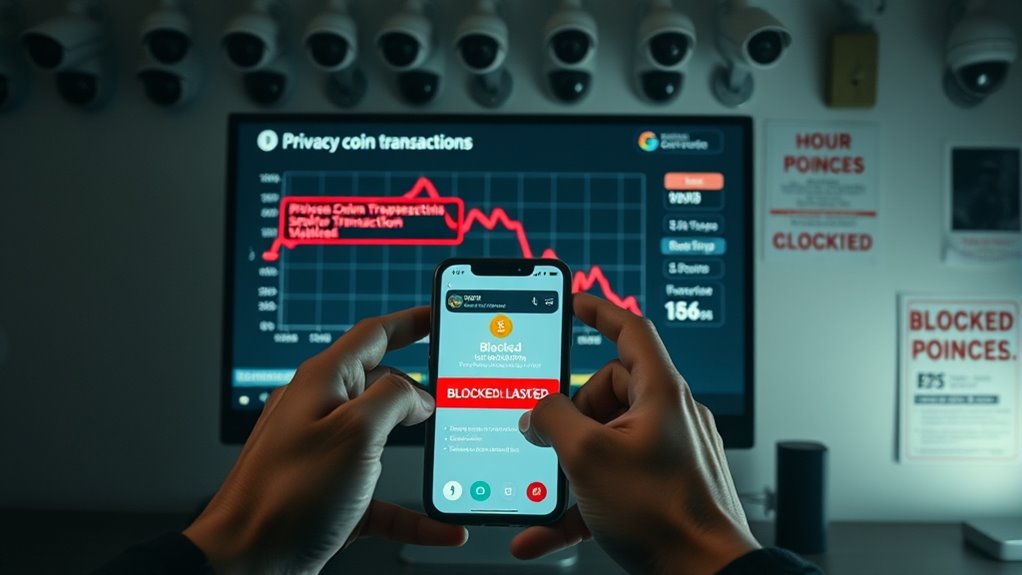Government bans on privacy coins mean you may find it harder to access or trade these assets, as exchanges often delist them to avoid legal issues. You might also face increased scrutiny or restrictions on using privacy-focused cryptocurrencies, limiting your options and reducing liquidity. These measures can undermine your financial privacy and push you toward less regulated alternatives. If you want to understand how these bans could affect you and the crypto market, stay with us to learn more.
Key Takeaways
- Governments ban privacy coins due to concerns over illegal activities like money laundering and tax evasion.
- Exchanges are forced to delist privacy coins, limiting user access and reducing liquidity.
- Users face restrictions on privacy-focused cryptocurrencies, impacting their financial sovereignty.
- Developers innovate within legal limits, balancing privacy features with regulatory compliance.
- Regulations promote market shifts toward transparent cryptocurrencies and increase risks for privacy coin participants.

Governments worldwide are increasingly banning privacy coins, citing concerns over their potential use for illegal activities. As a user or exchange operator, you might feel this tightening regulation impacts your ability to access or offer these cryptocurrencies. Privacy coins, designed with advanced privacy technology, allow users to conduct transactions without revealing their identities or transaction details. While this feature provides essential privacy, it also draws regulatory scrutiny. Governments see privacy technology in these coins as a double-edged sword: a tool for legitimate privacy needs but also a potential avenue for money laundering, tax evasion, and other illicit activities. Consequently, many regulators are pushing for stricter cryptocurrency regulation, targeting privacy-focused coins specifically.
This shift impacts you directly because many exchanges are being forced to delist privacy coins or refuse to support them altogether. When governments impose bans or restrictions, exchanges often face legal and financial penalties if they continue to facilitate privacy coin trading. As a result, your options to buy, sell, or hold privacy coins become limited. You might find yourself unable to access the coins you once trusted or used for privacy reasons, which can be frustrating, especially if you value financial sovereignty. The bans also influence the broader market, reducing liquidity and making it harder to find reputable platforms that support these coins. Additionally, regulatory scrutiny on privacy coins is prompting some users to explore alternative solutions that aim to balance privacy with compliance.
Furthermore, these regulatory crackdowns are pushing developers and users to innovate within legal boundaries. Some might seek privacy technology solutions that are less conspicuous or attempt to develop new protocols that can bypass restrictions. However, these efforts often face the risk of running afoul of emerging laws, which increasingly define privacy coins as high-risk assets. As a user, you need to stay informed about evolving laws to avoid inadvertently engaging in illegal activities or facing penalties. For exchanges, compliance becomes a balancing act: adhering to local laws while maintaining a diverse offering of cryptocurrencies. This can lead to a market where privacy coins are less accessible, encouraging a shift toward more transparent cryptocurrencies that fit within regulatory frameworks.
Ultimately, government bans on privacy coins reflect a broader effort to regulate the cryptocurrency space more tightly. While these measures aim to increase transparency and reduce crime, they also restrict your freedom to use privacy technology freely. Whether you’re a casual user or an exchange operator, understanding the implications of cryptocurrency regulation is *vital*. Staying informed about legal developments helps you navigate this complex environment, ensuring you’re compliant and aware of the risks and opportunities presented by these evolving policies. The ongoing regulation of privacy coins highlights the importance of understanding self watering plant pots and other innovative tools that promote sustainability and security in various fields.
Frequently Asked Questions
How Do Privacy Coin Bans Affect Global Cryptocurrency Adoption?
Privacy coin bans slow down global cryptocurrency adoption by creating regulatory challenges that scare off new users and investors. You might find it harder to access or use privacy-focused coins, which limits your options and increases uncertainty. These bans can also cause market implications, like decreased liquidity and innovation, making it tougher for the broader crypto ecosystem to grow. As a result, widespread adoption gets delayed or diverted to less regulated alternatives.
What Legal Risks Do Users Face When Trading Privacy Coins?
When trading privacy coins, you face legal liabilities if you don’t adhere to regulations, as authorities may view your activities as non-compliant. You could encounter fines or sanctions if you fail to meet legal requirements or if exchanges demand stricter regulatory compliance. To stay safe, always guarantee your transactions follow local laws, and be aware of the risks associated with using privacy coins in regions with stringent regulations.
Can Privacy Coins Be Legally Used in Countries Without Bans?
Yes, you can use privacy coins legally in countries without bans. However, you should be aware of potential legal loopholes and regulatory loopholes that could change your status. Authorities might still scrutinize transactions or impose future restrictions, so stay informed about evolving laws. Always guarantee you’re compliant with local regulations and understand that even in unbanned regions, legal risks can arise if regulations tighten.
How Do Exchanges Technically Comply With Privacy Coin Restrictions?
Imagine a tightrope walker balancing carefully, much like how exchanges navigate blockchain transparency and regulatory compliance. They technically comply with privacy coin restrictions by implementing sophisticated KYC procedures, transaction monitoring, and restricting certain privacy features. This guarantees they meet legal standards while maintaining operational integrity. You, as a user, benefit from a safer environment, knowing the platform respects regulations, even as it balances on the thin line of privacy and transparency.
Are There Privacy Coin Alternatives Unaffected by Government Bans?
You can consider privacy coin alternatives like Monero or Pirate Chain, as they’re generally unaffected by bans due to their strong privacy features. These coins use advanced cryptography to hide transaction details, making them harder for governments to regulate. While some exchanges may restrict them, many still list these options, giving you safer choices if you want to maintain privacy without fear of bans or restrictions.
Conclusion
You might find it surprising that privacy coins like Monero make up only about 1% of the total cryptocurrency market, yet they’re often targeted by government bans. These restrictions can push users and exchanges to seek alternative solutions, possibly fueling innovation or driving illicit activities underground. As regulations tighten, staying informed becomes essential to navigate the evolving landscape responsibly and securely. Your awareness can help you adapt and protect your investments effectively.









